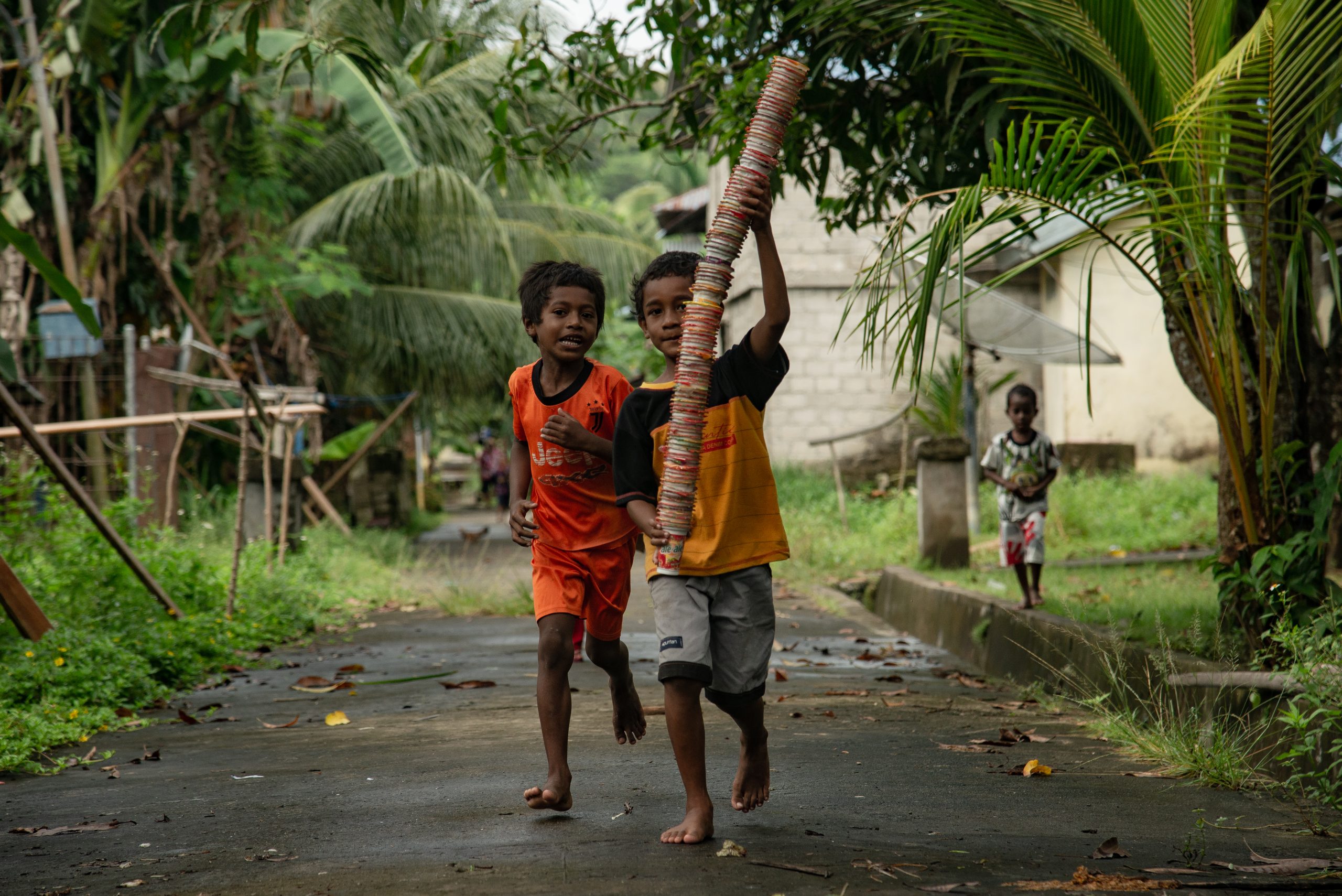
On a pathway in Buan Kataloka Village, Pulau Gorom Sub District, Seram Bagian Timur District, Maluku Province, three primary school kids were picking up some used plastic cups. They were happily picking up the waste and brought it to a woman.
That woman is Nuruja Rumatiga, born in 1982, known for promoting plastic waste recycling in the village.
Nuruja will clean every plastic cup collected with a bowl of clean water, then sun dry it separately for further processing. Kids who helped her collect the used plastic cups were usually paid around IDR 2,000 to 10,000.
“Here’s some tip,” Nuruja said on Saturday, May 17 2025, while smiling to the kids.
The plastic waste collected not far from Nuruja’s house—around 100 meters away. The village has no proper trash bin. People are throwing their waste, including plastic waste, recklessly.
Nuruja and her fellow housewives associated in a recycled hand craft group brought in new hope for waste management in their village.
“The kids are so helpful. If they bring some, we tip them,” she said.
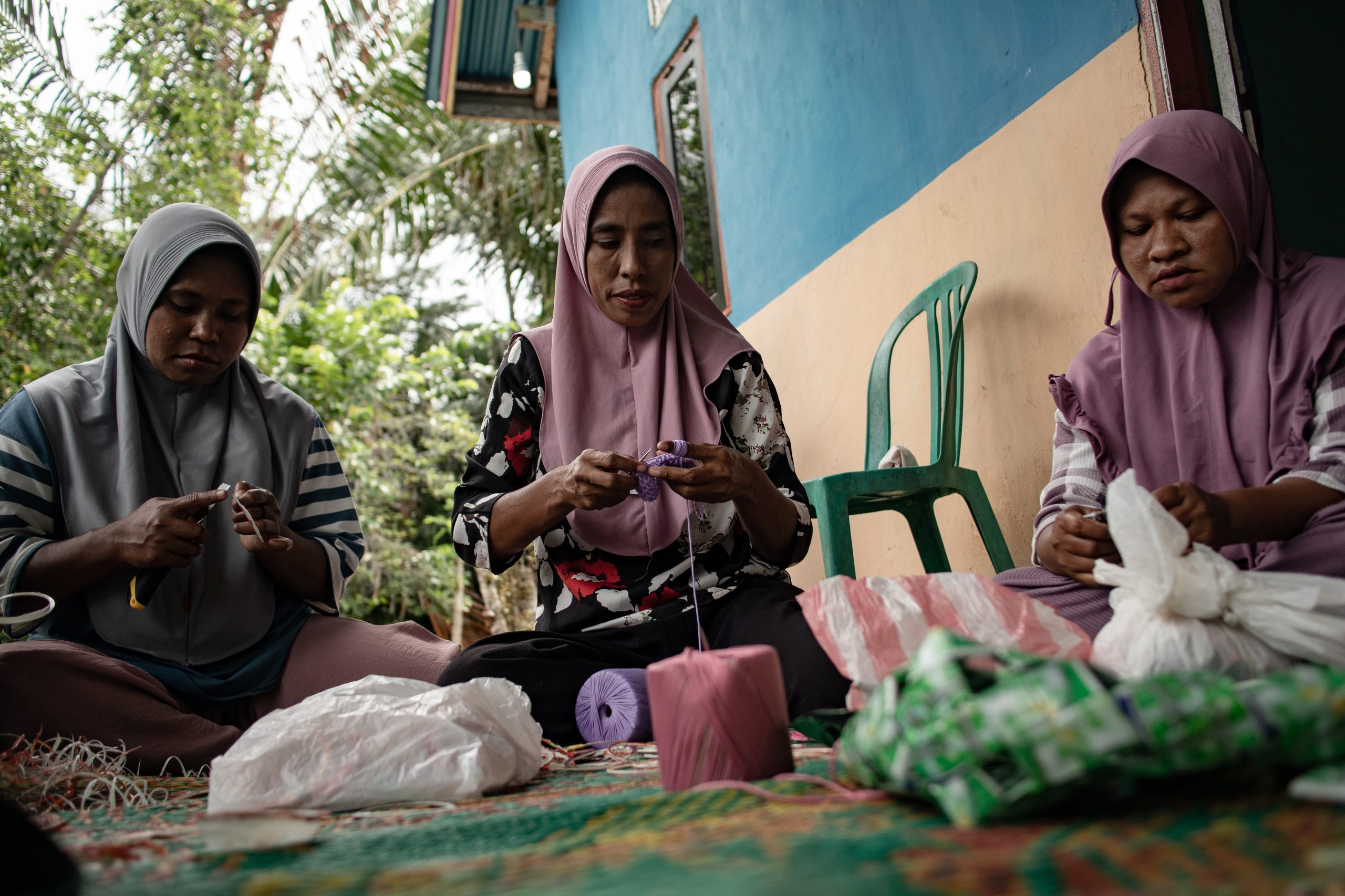
Work from Terrace
Every weekend, seven women sit on Nuruja’s terrace. On a mat, some materials as wool yarns, scissors, needles, small knives, and a pile of used plastics are laid. They work, chat, and encourage each other. Some do the cutting, some the knitting, and some start the weaving.
This group participated in the training organized by BangKIT Program in 2024. In the program, the ladies were trained to utilize plastic waste turning it into various hand craft products, such as flowers, bags to plates.
The training that Nuruja and other ladies joined in Buan Kataloka Village was a rural livelihood improvement activity identified by the people in their village planning. In December 2023, the Inclusive Rural Livelihood Development Program in Eastern Indonesia (BangKIT) facilitated sustainable livelihood development plans in some villages in Gorom Island. Buan Kataloka Village was one of them. After having a long discussion on the plan development, the community and village administration identified the development potential and the need to develop the identified potential. One of them was the technical training, processing plastic waste into handicrafts.
Buan Kataloka Village in Gorom Island is a coastal area. In the coastal area, plastic waste from various food and drink packages pollutes the sea and its ecosystem therefore harmful to the resources and livelihood in the sea and also reduces the aesthetic value of the environment. Processing plastic waste into handcrafted products contributes not only to plastic waste management and marine resource preservation, but also introduces value added economy for the rural community. For the maximum use of the plastic waste, people need backup knowledge to process the waste. The training on plastic waste craft processing was then becoming one of the proposals addressed in the village plan, whereas the BangKIT Program was there to support its implementation.
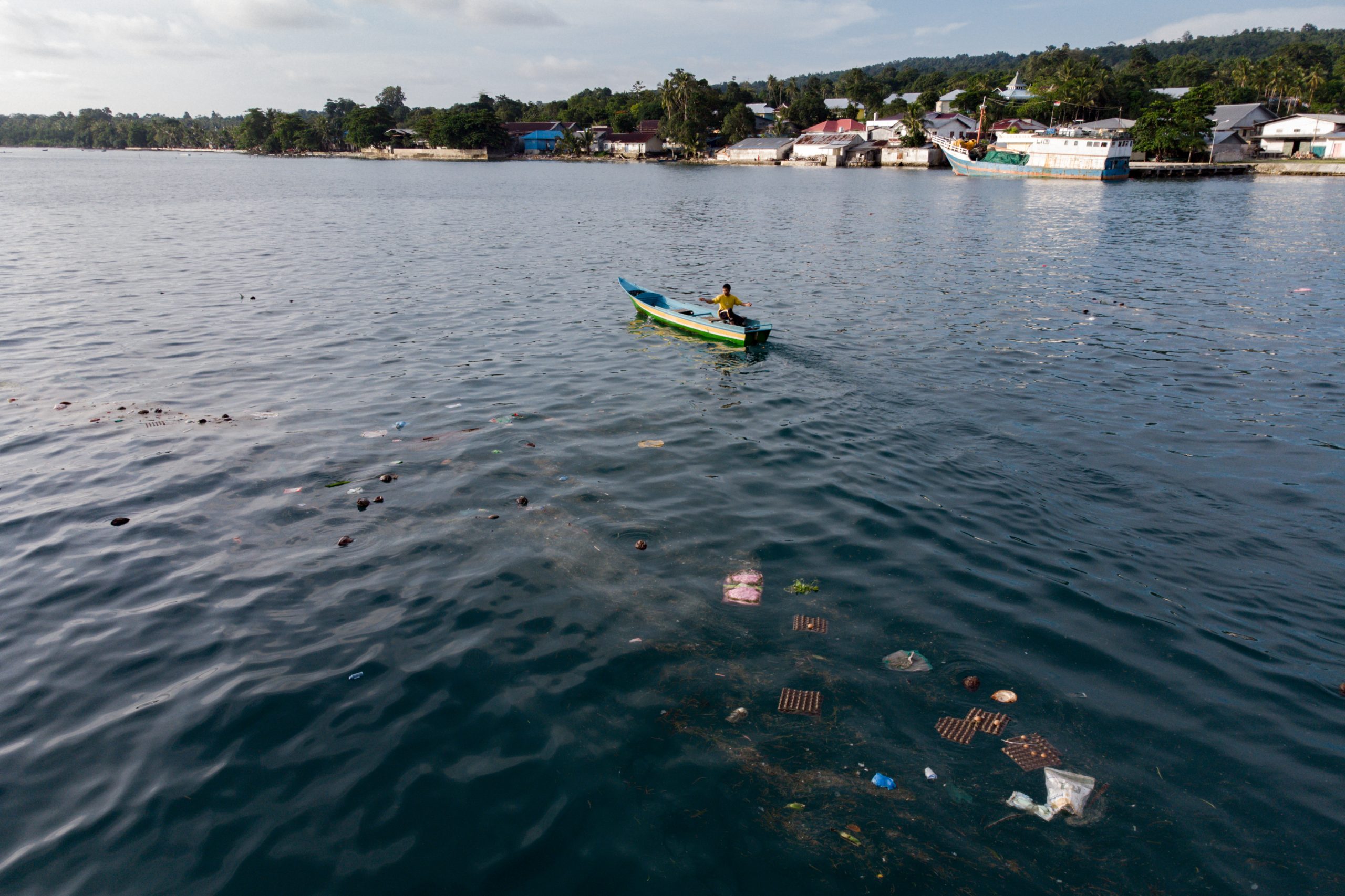
They also received stimulating materials, such as colorful yarns and other supporting tools. The ladies know how to weave before participating in the training.
They do it in their free time. After the training, they are taking it as a serious group work. They make bags from the used pop ice packages, plates from plastic cups and many others.
They have diverse products. From plastic waste, they make shopping bags, cup holders, and plates. From the yarns, they make tiny bags for water bottles (tumblers), phone pouches, and lighter cases. Every product is diligently made, though they are often tied up with the house chores.
“Making bags or plates is not hard,” Nuruja stated. “It is just a matter of time. We are housewives, so much work at home.”
One of the group members, Basege Kalere, admitted that at the beginning of the training they were only asked to make flowers from the plastic waste. The process started with cleaning the waste and drying them up one by one.
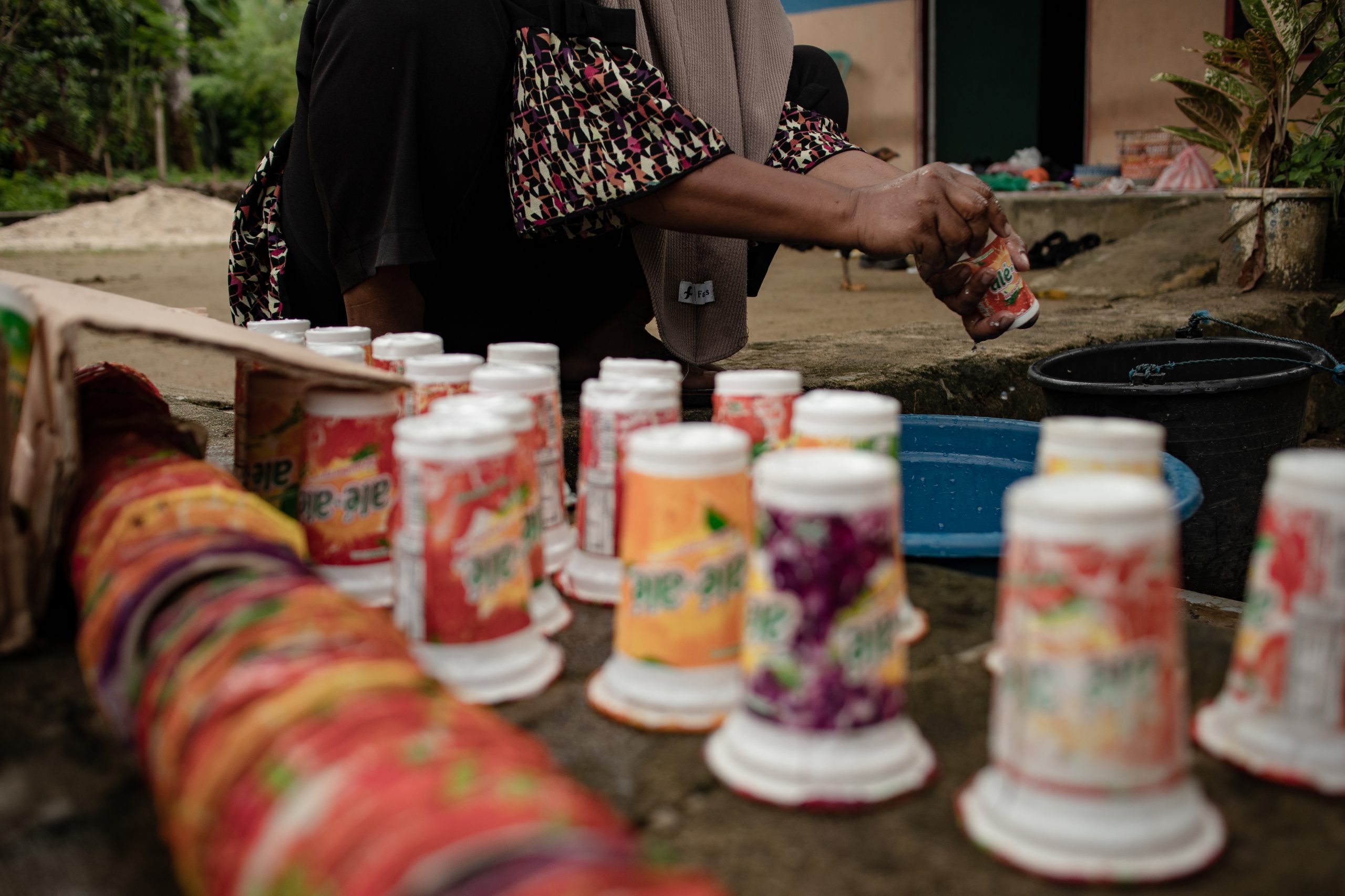
Next was weaving or shaping them into the given design. According to Basege, women in their village have the basic skills, all they need is guidance to work as a group.
“Making flowers and bags is not difficult. They all can do it,” Basege, a 39-year-old woman, expressed.
Unfortunately, it is hard for the ladies to focus on producing due to the numerous household chores. They must take care of the children, cook, and clean the house—those are the main responsibilities. However, their spirit to work is intact.
The product is launched
Buan Kataloka is a small village with approximately 645 inhabitants. Based on the data from the Central Statistic Agency of Maluku Province in 2024, the population consists of 316 females and 329 males. Despite its location on the island with 11 hours of travel time by ferry from the district capital in Bula Sub District, the spirit of the village women is unshakable.
Currently, they rely on the most available waste materials, such as pop ice and detergent packages. The waste is magically turned into products with economic value. For example, shopping bags and baskets are sold for IDR 50,000 to 75,000. Plates made of ale-ale cups are rated IDR 60,000/dozen.
“One bag is sold,” Nuruja proudly declared.
The wool yarn products are also popular among the locals. Products, like tumbler bag is sold for IDR 50,000, phone pouch for IDR 25,000, mask strap and lighter case for respectively IDR 15,000. It is a group work, therefore the sales will be placed in the group account subsequently used for purchasing materials when they are out of stocks.
“The ladies also posted on social media and received many likes for the phone and lighter pouches,” Nuruja added.
Nuruja said, in a day, she can make two phone pouches, three lighter cases, and one tumbler bag. She also once made and sold her own products with the assistance of a friend from Southeast Maluku District. After selling a phone pouch for IDR 25,000, she put IDR 10,000 in her saving, and used IDR 15,000 for the household needs.
“A small favor for hubby,” she said.
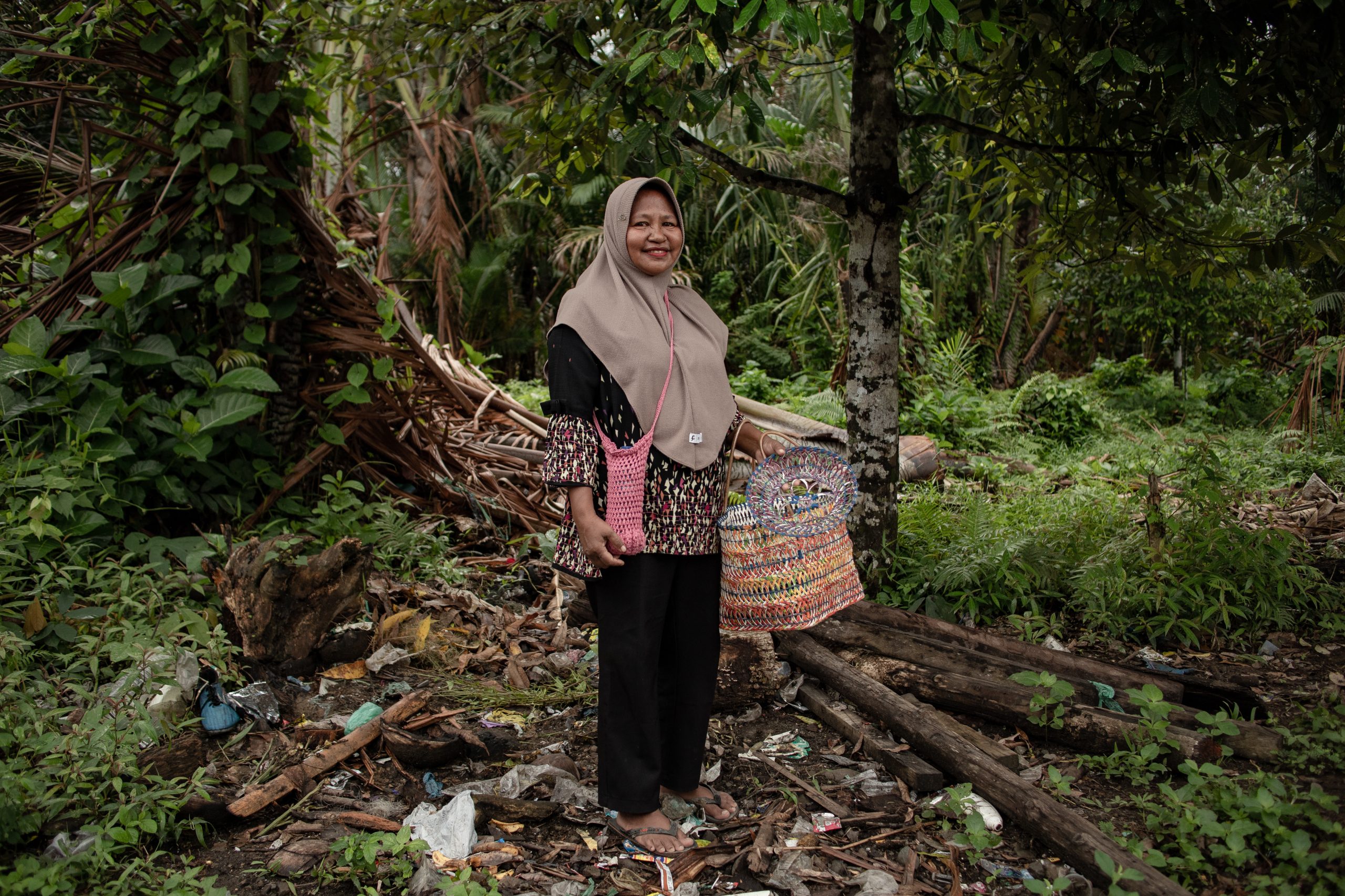
Dealing with Time
Despite the high enthusiasm for the works, this group must face its biggest challenge in allocating time for both production and household obligation. Take Basege Kalere as an example, she is capable of making four phone pouches in a day. However, allocating time for family and crafting is tough, therefore she barely complete the products.
“Hectic at home. I must take care of the kids and the house too,” said Basege.
Material scarcity is also an issue, plastic cup waste in particular, as the main material. If it is hard to get, it is automatically hard for her to meet the customer’s needs. The local government minimum involvement is another issue. This women’s group has not received subsequent support for the recycling business development.
Nuruja explained that they work collectively, therefore, all the sales are put into the group account. If the ladies work on the crafting independently outside the group meeting, the cash goes into their accounts.
“In the group, the sales are shared. If we make and sell by ourselves, it goes to our accounts,” she explained.
This time, relatively many orders, including orders from outside the village for hand craft products, like plates and bags. However, the time and labor constraints unable them to handle all the orders.
“when we have time, we work, but sometimes no time,” said Nuruja. Though hard, She and the other ladies will keep on working even after BangKIT Program terminated.
Now, the handicraft group in Buan Kataloka is producing actively without support from the local government. They want to further develop their skills and bring in the economic impact for the families. Thus, she seeks attention from the village administration or the district, hoping they can provide equipment, marketing, and further training.
One thing is for sure, the small movement they made has a big impact. It is not only reducing plastic waste in the village, but also opening new economic opportunities despite all the disadvantages.
“We want to keep going,” Nuruja concluded. “With the available plastic waste, we can always work on something.”